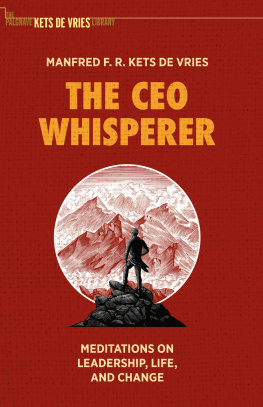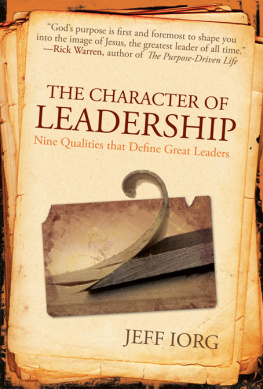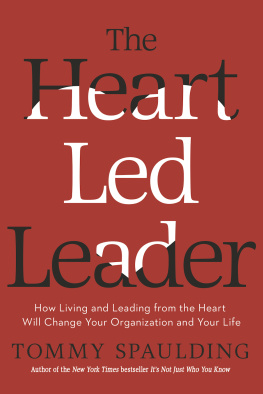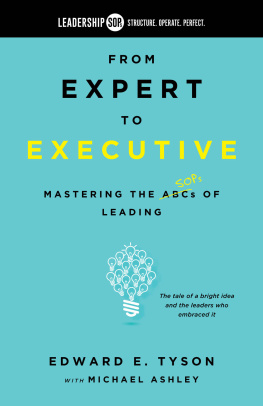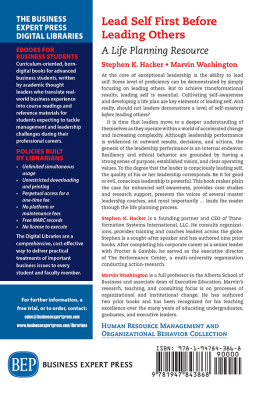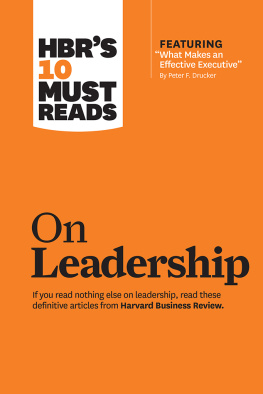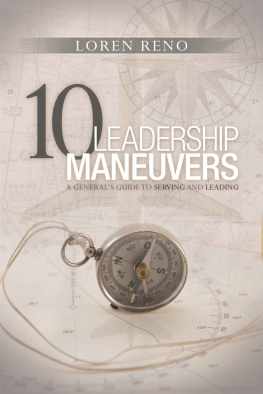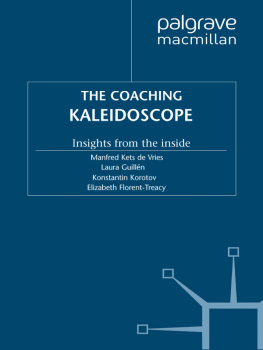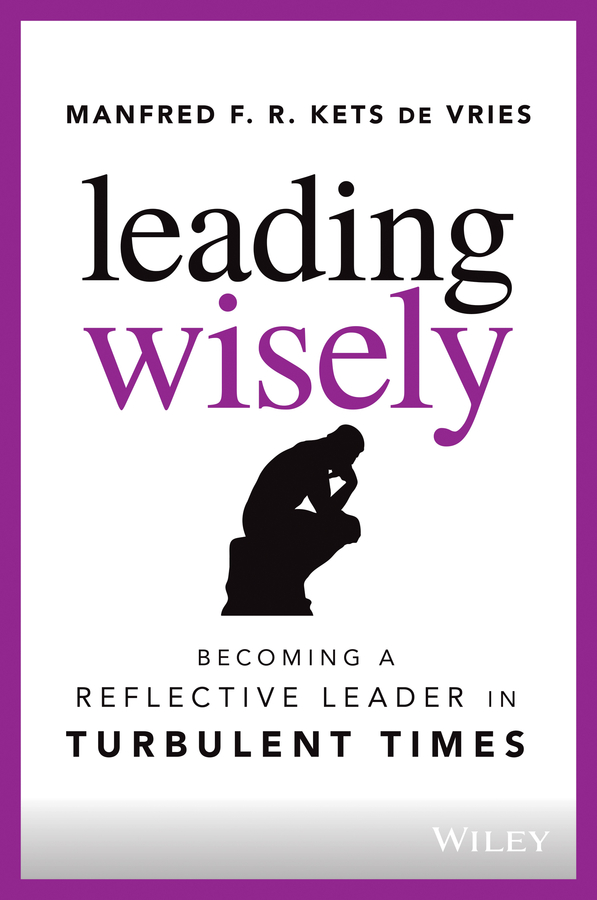
Table of Contents
Guide
Pages
Leading Wisely
Becoming a Reflective Leader in Turbulent Times
Manfred F. R. Kets de Vries

This edition first published 2022.
2022 by Manfred F. R. Kets de Vries
Registered office
John Wiley & Sons Ltd, The Atrium, Southern Gate, Chichester, West Sussex, PO19 8SQ, United Kingdom
For details of our global editorial offices, for customer services and for information about how to apply for permission to reuse the copyright material in this book please see our website at www.wiley.com.
All rights reserved. No part of this publication may be reproduced, stored in a retrieval system, or transmitted, in any form or by any means, electronic, mechanical, photocopying, recording or otherwise, except as permitted by the UK Copyright, Designs and Patents Act 1988, without the prior permission of the publisher.
Wiley publishes in a variety of print and electronic formats and by print-on-demand. Some material included with standard print versions of this book may not be included in e-books or in print-on-demand. If this book refers to media such as a CD or DVD that is not included in the version you purchased, you may download this material at http://booksupport.wiley.com. For more information about Wiley products, visit www.wiley.com.
Designations used by companies to distinguish their products are often claimed as trademarks. All brand names and product names used in this book are trade names, service marks, trademarks or registered trademarks of their respective owners. The publisher is not associated with any product or vendor mentioned in this book.
Limit of Liability/Disclaimer of Warranty: While the publisher and author have used their best efforts in preparing this book, they make no representations or warranties with respect to the accuracy or completeness of the contents of this book and specifically disclaim any implied warranties of merchantability or fitness for a particular purpose. It is sold on the understanding that the publisher is not engaged in rendering professional services and neither the publisher nor the author shall be liable for damages arising herefrom. If professional advice or other expert assistance is required, the services of a competent professional should be sought.
Library of Congress Cataloging-in-Publication Data
Names: Kets de Vries, Manfred F. R., author.
Title: Leading wisely : becoming a reflective leader in turbulent times / Manfred F. R. Kets de Vries.
Description: Chichester, West Sussex, United Kingdom : Wiley, 2022. | Includes index.
Identifiers: LCCN 2021052110 (print) | LCCN 2021052111 (ebook) | ISBN 9781119860396 (hardback) | ISBN 9781119860419 (adobe pdf) | ISBN 9781119860402 (epub)
Subjects: LCSH: Leadership. | Wisdom.
Classification: LCC HD57.7 .K4794 2022 (print) | LCC HD57.7 (ebook) | DDC 658.4/092dc23/eng/20211029
LC record available at https://lccn.loc.gov/2021052110
LC ebook record available at https://lccn.loc.gov/2021052111
Cover Design: Wiley
Cover Image: Neoplantski/Shutterstock
Preface
By three methods we can learn wisdom. First, by reflection which is noblest; second, by imitation, which is easiest; and third by experience, which is the bitterest.
Confucius.
All truly wise thoughts have been thought already thousands of times; but to make them truly ours, we must think them over again honestly, until they take root in our personal experience.
Johann Wolfgang von Goethe
Being foolish
Aristotle is often attributed with the statement, There is a foolish corner in the brain of the wisest man. One cannot help but wonder if he was thinking of something comparable to the idea of the so-called Darwin Awards competition. If you do not know what I am referring to, let me explain. The Darwin Award is a rather tongue-in-cheek honor given to people who have singled themselves out by stupidly risking life and limb in the dumbest way possible. To be selected for this award, the following criteria must apply:
In the spirit of Charles Darwin, the Darwin Awards commemorate individuals who protect our gene pool by making the ultimate sacrifice of their own lives by eliminating themselves in an extraordinarily idiotic manner, thereby improving our species chances of long-term survival.
In other words, the candidate's foolishness must be unique and sensational. In fact, if the Darwin Awards does prove anything at all, it is that even presumably intelligent people can remove themselves from the gene pool in apparently ridiculous ways.
I remember how I could well have received an honorable citation for the Darwin Awards while canoeing with my wife and two children on the Concord River in Massachusetts. Due to the fast-melting snow, the river had completely flooded its banks. Large parts of what used to be land were now inundated. While happily paddling between the many trees that were now standing in the water, we came across a large, low hanging branch that was blocking our passage. Showing no judgement at all, I told everyone in the canoe to lean to one side to be able to pass under that branch, with the obvious result that the canoe keeled over and everyone suddenly spilled into the water. It was an amazingly stupid suggestion on my part.
Soaking wet, I fished the children out of the water and, for reasons of safety, put them on this infamous branch. Together with my wife as we were able to stand in the overflowed river we tilted the canoe to pour out the water. Subsequently, the two of us, completely soaked, paddled back to the shore like mad. When we got into our car, we put on maximum heat and drove home to Cambridge as fast as possible. We were lucky that we did not drown or catch pneumonia, but in future canoeing expeditions, I kept William Blake's admonition in mind: A fool sees not the same tree that a wise man sees. I had learned something the hard way. I had learned from experience. Never was such an accident going to happen to me again. In the future, I would have better judgement. In future actions, I would try to be wiser.
Beyond book learning
Even though I wrote this book only recently, in more than one way, these musings on wisdom in the context of leadership have been in the works for a very long time. In fact, it is fair to say that this book reflects the ruminations of my own struggles with foolishness, all the while trying to acquire a touch of wisdom. Although book learning has always been important to me, knowledge alone never seemed to be enough in dealing with many of the questions that I faced in my daily work as a professor, psychoanalyst, consultant and executive coach. Although I always thought that to acquire knowledge, studying does not hurt, to acquire wisdom, clearly something more was needed. Making efforts to appear knowledgeable did not seem to be good enough. Among other things, I realized that I needed to learn how to observe. If I wanted to act wisely, I needed to really make sense of what was going on around me. Fortunately, in that respect, my long psychoanalytic training turned out to be very useful.
Apart from needing to become more proficient in seeing things, much of what I have learned in life has also come to pass through the questioning of my students. These demanding interchanges because, far too often, it had to do with questions to which there were no easy answers were a good lesson in humility. Again and again, these discussions reminded me of my ignorance it showed how little I really did know. In hindsight, I realized that I became even more aware of my limitations in sense making when I designed a program for C-suite executives at INSEAD, where I have been teaching for a very long time. Working with cohorts of C-suite executives from all over the globe proved to be even more of a challenge, compared to working with the much younger MBA students. Very often, the latter tended to be more gullible, while in many instances, the older executives would present me with extremely complex problems for which I had no easy answers.
Next page

